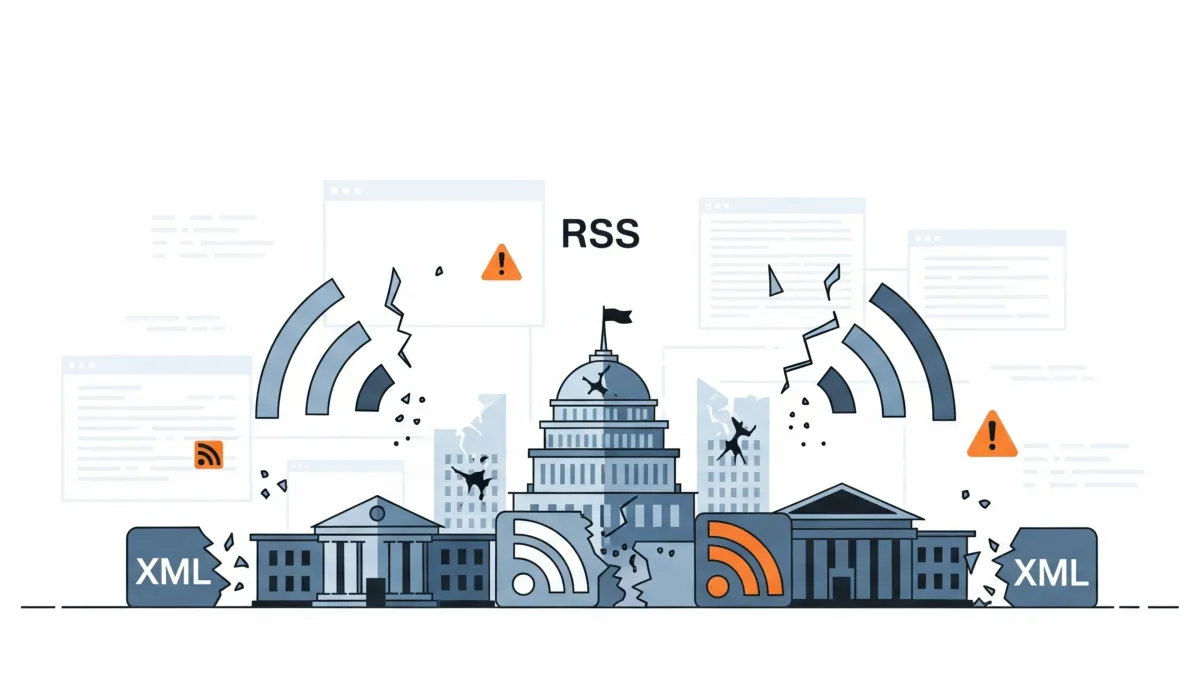
Google engineer Mason Freed has proposed eliminating XSLT (Extensible Stylesheet Language Transformations) support from web browsers through the Web Hypertext Application Technology Working Group (WHATWG), potentially disrupting government websites across multiple countries that rely on XML styling for RSS feed display. The proposal, documented in WHATWG Github issue #11523 on August 20, 2025, has drawn criticism from developers who identified extensive government usage that Freed's initial analysis overlooked.
Subscribe PPC Land newsletter ✉️ for similar stories like this one. Receive the news every day in your inbox. Free of ads. 10 USD per year.
According to documentation submitted by developer dmitriid in WHATWG issue #11582, at least six major government and regulatory agencies currently depend on XSLT for RSS feed functionality. The United States Congress uses client-side XSLT to transform and display legislative texts, with examples including House Resolution 3617 and other bills accessible through congress.gov and govinfo.gov XML feeds. The National Weather Service employs XSLT to present current weather observation data from XML sources, enabling real-time meteorological information display through browser-based RSS feeds.
European government agencies face similar disruption risks. The European Parliament utilizes client-side XSLT to transform and display information on European political parties from XML feeds. Additionally, the European Pollutant Release and Transfer Register depends on XSLT to present method type codes from XML data, supporting environmental monitoring and regulatory compliance across member nations.
Technical infrastructure depends on browser XSLT support
Government RSS implementations require XSLT processing to convert raw XML data into human-readable formats when accessed directly through web browsers. Without XSLT support, these feeds would display as unformatted XML code, significantly degrading accessibility for citizens, journalists, and researchers who monitor government activities through RSS subscriptions.
The National Weather Service's current observation feeds exemplify critical infrastructure that would face immediate impact. Weather stations across the United States publish XML data that transforms into readable meteorological information through XSLT styling. Emergency management agencies, agricultural organizations, and transportation authorities rely on this browser-accessible data for operational decisions.
Canadian government services also utilize XSLT-dependent RSS infrastructure. The Canadian Forest Service maintains weather station metadata feeds that transform XML data into accessible formats through browser-based XSLT processing. This functionality supports fire weather monitoring and forest management operations across Canada's vast wilderness areas.
Australia's Therapeutic Goods Administration employs XSLT transformation for regulatory code definitions distributed through XML feeds. Pharmaceutical companies, healthcare providers, and regulatory compliance professionals access this information through browsers that process XSLT styling to present technical regulatory data in usable formats.
 PPC LandLuis Rijo
PPC LandLuis Rijo
Browser vendor coordination raises standardization concerns
Mozilla engineer "smaug" expressed immediate support for XSLT removal in WHATWG discussions, while WebKit representatives indicated "cautious support" contingent on other browsers implementing removal first. This coordination pattern reflects oligopolistic browser development dynamics where major technology companies control fundamental internet infrastructure decisions affecting government operations.
According to WHATWG discussion documentation, browser vendors characterize XSLT as "legacy" technology despite continued widespread usage across government publishing workflows. The podcast ecosystem alone represents hundreds of millions of users consuming RSS-distributed content daily, while WordPress installations numbering over 500 million automatically generate RSS feeds for content syndication purposes.
Anne van Kesteren from Mozilla proposed coordinating console warnings across browsers, indicating pre-planned deprecation strategies similar to those used for other web technologies. The discussion reveals browser vendors treating XSLT removal as inevitable rather than debatable, despite substantial developer opposition documented in Github issue comments.
Mason Freed acknowledged in WHATWG discussions that RSS feed display represents "the largest source of current usage" for XSLT technology. However, he suggested his WebAssembly-based polyfill could provide replacement functionality, though polyfill solutions require JavaScript execution and additional resource loading, contradicting RSS feeds' design principles of simplicity and universal accessibility.
Subscribe PPC Land newsletter ✉️ for similar stories like this one. Receive the news every day in your inbox. Free of ads. 10 USD per year.
Government data accessibility faces systematic reduction
The XSLT removal proposal continues a documented pattern of actions specifically targeting RSS and XML-based content distribution infrastructure that government agencies have adopted for public information dissemination. Google's 2013 discontinuation of Google Reader eliminated the most popular RSS aggregation service, forcing millions of users toward social media feeds and centralized content platforms controlled by major technology companies.
Mozilla's 2018 RSS support removal from Firefox established precedent for browser vendors abandoning XML-based technologies despite user objections. Firefox actively prevents RSS feeds from displaying properly in browsers, treating them worse than generic XML documents. This hostile approach contradicts Mozilla's stated mission of supporting an open web while creating barriers to government information access.
According to developer feedback in WHATWG issue #11582, "any superficial research into 'just 357' sites happened after people had objected" to the XSLT removal proposal. This indicates that Google's initial analysis failed to identify obvious government use cases that required community intervention to surface during the standardization process.
Government websites represent critical infrastructure for democratic transparency and public information access. RSS feeds enable automated monitoring of legislative activities, regulatory announcements, and emergency information by journalists, advocacy organizations, and citizens. Browser-based XSLT processing ensures these feeds remain accessible without requiring specialized software or technical expertise.
 PPC LandLuis Rijo
PPC LandLuis Rijo
Regulatory agencies depend on XML transformation workflows
Beyond RSS feed display, government agencies utilize XSLT for various XML document processing workflows that extend beyond simple content syndication. Legislative bodies publish bills, resolutions, and regulatory documents in XML formats that require XSLT transformation for public accessibility through standard web browsers.
According to the congress.gov implementation, legislative text publishing relies on XML structured data with XSLT styling to present complex legal documents in readable formats. Citizens, legal professionals, and advocacy organizations access this information directly through browsers without requiring specialized legislative research tools or paid database subscriptions.
Weather services across multiple countries have standardized on XML data formats with XSLT presentation layers for meteorological information distribution. This approach enables real-time weather data access for emergency management, agricultural planning, and transportation safety applications that depend on browser-accessible information sources.
Environmental monitoring agencies publish pollution data, chemical release information, and regulatory compliance records through XML feeds that transform into accessible formats via XSLT processing. Industrial facilities, environmental consultants, and regulatory compliance professionals rely on this browser-accessible data for operational and legal requirements.
The systematic removal of XSLT support would force government agencies to either maintain parallel HTML publishing workflows or accept degraded public access to critical information resources. Both alternatives impose additional costs on taxpayer-funded operations while reducing transparency and democratic accountability.
 PPC LandLuis Rijo
PPC LandLuis Rijo
Technical alternatives present implementation challenges
Mason Freed's proposed WebAssembly-based polyfill solution introduces complexity and performance limitations that contradict the design principles underlying government RSS implementations. Polyfill solutions require JavaScript execution capabilities and additional resource loading that may not function consistently across all browser configurations or accessibility tools used by citizens with disabilities.
Government information systems prioritize broad compatibility and accessibility compliance over advanced web technologies. RSS feeds with XSLT styling provide universal access across legacy browsers, assistive technologies, and low-bandwidth environments that serve diverse populations including rural communities and users with older computing equipment.
Browser extension solutions face similar limitations, particularly within Chrome's Manifest V3 framework that restricts extension capabilities. Government employees, journalists, and citizens accessing official information through institutional networks may lack permissions to install browser extensions, creating barriers to information access that currently functions through standard browser features.
Alternative XML processing approaches require server-side transformation or dedicated feed reader applications that increase infrastructure costs for government agencies while reducing public accessibility. These solutions transfer processing overhead from citizen devices to government servers, potentially creating scalability challenges during emergency situations or high-interest legislative events.
The financial impact extends beyond government operations to affect news organizations, civic technology projects, and transparency initiatives that depend on RSS feeds for automated government information monitoring. Independent journalism and advocacy organizations particularly rely on RSS-based workflows for tracking regulatory announcements and legislative activities across multiple agencies simultaneously.
 PPC LandLuis Rijo
PPC LandLuis Rijo
International implications affect regulatory coordination
European Union agencies face coordinated disruption across member nations as XSLT removal would simultaneously impact RSS feeds from the European Parliament, environmental monitoring systems, and regulatory agencies that have standardized on XML-based information distribution. Brexit has already complicated information sharing between UK and EU regulatory bodies, making additional technical barriers particularly problematic for international coordination.
The European Pollutant Release and Transfer Register exemplifies cross-border regulatory infrastructure that depends on standardized XML processing. Environmental compliance monitoring, chemical safety coordination, and pollution tracking across EU member nations rely on browser-accessible data transformation that XSLT removal would disrupt.
Canada's federal agencies coordinate with United States counterparts on various regulatory and environmental monitoring activities that utilize RSS feeds for information sharing. The Canadian Forest Service's weather station metadata, accessed through XSLT-styled RSS feeds, supports international fire management coordination and meteorological data exchange with US agencies.
Australia's Therapeutic Goods Administration participates in international pharmaceutical regulatory coordination that relies on XML-based information sharing. Medical device approvals, drug safety monitoring, and regulatory harmonization efforts depend on accessible data formats that serve regulatory professionals across multiple countries and time zones.
 PPC LandLuis Rijo
PPC LandLuis Rijo
Timeline
- 2013: Google discontinues Google Reader RSS service eliminating dominant feed aggregator, proposes first XSLT removal targeting RSS feed styling
- 2015: WHATWG introduces Fetch API excluding XML processing methods while providing JSON support, Google proposes SMIL deprecation affecting RSS feed enhancement capabilities
- 2018: Mozilla removes RSS support from Firefox version 64, actively preventing RSS feed display and treating them worse than generic XML documents
- 2019: Google announces Extension Manifest V3 changes that restrict RSS feed reader browser extensions
- 2024: Chrome delays third-party cookie deprecation while maintaining pressure on RSS-based content distribution
- August 20, 2025: Google abandons cookie deprecation but launches new XSLT removal proposal through WHATWG targeting RSS feed display capabilities
- August 20, 2025: Developer communities identify government RSS dependencies overlooked in initial analysis
- January 2025: W3C streamlines web standards process with major document updates affecting technical review procedures
- December 2024: Browser market concentration shows Chrome's 64.7% dominance enables unilateral infrastructure decisions
Subscribe PPC Land newsletter ✉️ for similar stories like this one. Receive the news every day in your inbox. Free of ads. 10 USD per year.
Summary
Who: Google engineers led by Mason Freed propose XSLT removal through WHATWG, with Mozilla support from employee "smaug" and others, affecting government agencies including United States Congress, National Weather Service, European Parliament, Canadian Forest Service, and Australia's Therapeutic Goods Administration.
What: Proposal to remove XSLT support from web browsers, eliminating ability to style XML documents including government RSS feeds directly in browsers, forcing raw XML display that degrades public access to legislative texts, weather data, regulatory information, and environmental monitoring across multiple countries.
When: WHATWG Github issue created August 20, 2025, following earlier Chromium issue, marking Google's second major XSLT removal attempt since 2013 that originally targeted RSS infrastructure before facing developer opposition until 2018.
Where: Proposal submitted through WHATWG standards organization affecting Chrome, Firefox, Safari, and Edge browsers globally, with specific impact on government websites in United States, European Union, Canada, and Australia that rely on browser-based XML transformation.
Why: Google cites security vulnerabilities and resource constraints while critics argue strategic motivation to eliminate decentralized government information distribution technologies that enable direct citizen access to official data without platform intermediaries.
Subscribe PPC Land newsletter ✉️ for similar stories like this one. Receive the news every day in your inbox. Free of ads. 10 USD per year.
PPC Land explains
XSLT (Extensible Stylesheet Language Transformations): A declarative programming language designed for transforming XML documents into other formats, primarily HTML for web browser display. XSLT operates through template matching and pattern-based transformations, enabling publishers to separate content structure from presentation logic. The technology processes XML data client-side, reducing server computational overhead while maintaining clean separation between data and styling. Current browser implementations support XSLT 1.0 from 1999, though more advanced versions like XSLT 2.0 and 3.0 remain unimplemented despite offering enhanced functionality including JSON processing capabilities.
RSS feeds: A web feed format built on XML that enables automated content distribution and syndication across websites and applications, representing one of the most successful and enduring technologies for decentralized content publishing. RSS feeds contain structured metadata about articles, podcasts, and other content, allowing aggregation services and applications to track updates automatically without requiring users to manually visit multiple websites. Government agencies utilize RSS feeds to distribute legislative updates, weather alerts, regulatory announcements, and emergency information to citizens, journalists, and other stakeholders who monitor official activities through automated subscription systems.
XML (Extensible Markup Language): A markup standard that defines rules for encoding documents in both human-readable and machine-readable formats, serving as the foundation for numerous web technologies including RSS feeds, sitemaps, configuration files, and data exchange formats. XML's hierarchical structure enables complex data relationships while maintaining compatibility across different systems and programming languages. Government agencies have standardized on XML for official document publishing because it separates content from presentation, enables automated processing, and provides long-term data preservation capabilities that support democratic transparency and public records access.
WHATWG (Web Hypertext Application Technology Working Group): A standards organization formed in 2004 by browser vendors to accelerate web technology development outside traditional W3C processes, originally founded by Apple, Mozilla, and Opera but now including Google as a dominant participant following Chrome's market success. WHATWG develops HTML specifications and related technologies through collaborative processes, though critics argue Google's influence has transformed the organization into a vehicle for promoting company-specific solutions rather than truly open standards development that serves diverse stakeholder interests including government information systems.
Browser vendors: Companies that develop and maintain web browser software, including Google (Chrome), Mozilla (Firefox), Apple (Safari), and Microsoft (Edge), which collectively control how citizens access government information through their technical decisions about web standards support. Browser vendors make unilateral choices about feature deprecation that directly impact government website functionality, content accessibility, and democratic transparency without requiring public consultation or regulatory oversight despite their role as critical information infrastructure gatekeepers.
Government websites: Official digital platforms operated by federal, state, and local agencies to provide public information, services, and democratic engagement opportunities to citizens, journalists, and other stakeholders. These websites serve critical functions including legislative transparency, regulatory compliance, emergency communications, and public records access that depend on standardized web technologies like RSS feeds and XSLT processing. Government websites prioritize broad accessibility, long-term compatibility, and universal access over cutting-edge web technologies, making them vulnerable to disruption when browser vendors deprecate established standards.
XML transformation: The technical process of converting structured XML data into different formats, typically HTML for web browser display, using technologies like XSLT that enable automated content processing without manual intervention. Government agencies rely on XML transformation to publish complex documents including legislation, regulations, weather data, and environmental monitoring information in formats accessible to diverse audiences with varying technical capabilities. This approach separates data content from presentation formatting, enabling agencies to maintain authoritative XML records while providing multiple output formats for different user needs.
Democratic transparency: The principle that government operations, decisions, and information should be accessible to citizens to enable informed participation in democratic processes and accountability oversight. RSS feeds and XML-based publishing systems support democratic transparency by enabling automated monitoring of government activities, legislative updates, and regulatory announcements without requiring citizens to manually check multiple agency websites. Browser vendor decisions to deprecate web technologies directly impact democratic transparency by creating barriers between citizens and government information sources.
Web standards: Technical specifications developed through collaborative processes that define how internet technologies should function across different platforms, browsers, and implementations to ensure interoperability and universal access. Organizations like WHATWG and W3C develop web standards through processes that theoretically balance competing interests including user needs, developer convenience, and commercial objectives from technology companies. However, the concentration of browser market share among few vendors enables unilateral standard changes that affect government operations and democratic information access without adequate stakeholder consultation.
Content syndication: The automated distribution of information from publishers to subscribers through standardized formats like RSS that enable real-time content delivery without requiring manual website visits or platform-specific applications. Government agencies use content syndication to distribute legislative updates, regulatory announcements, emergency alerts, and public information to journalists, advocacy organizations, and citizens who monitor official activities. Content syndication supports democratic engagement by enabling diverse stakeholders to track government actions across multiple agencies simultaneously through unified information workflows that RSS feeds and XML processing make possible.

